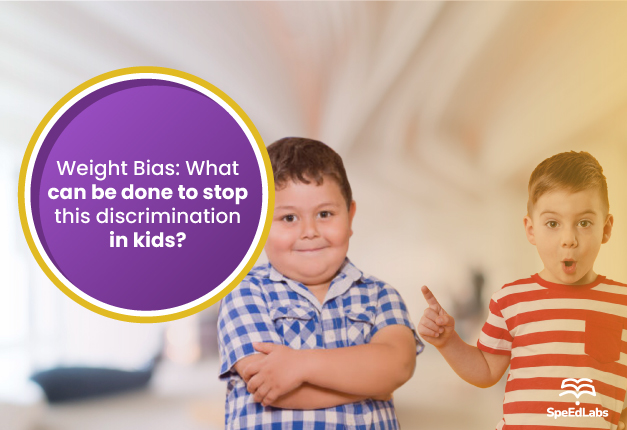Weight bias is reported to be one of the most widespread types of discrimination in everyday settings such as Employment, Healthcare, Education, Media, Family or Friends!
When it comes to overweight or obese children and adolescents, weight bias refers to negative attitudes, beliefs, and discrimination. Daily, these attitudes and beliefs manifest themselves in the form of teasing, bullying, and exclusion from activities. Negative attitudes toward overweight and obese children can start as early as preschool, according to research. Weight bias harms physical health and may reinforce obesity-causing behaviours like binge eating and avoiding physical activity.
People are judged based on their appearance in society. Unfortunately, there are more negative attitudes directed toward heavier people, which can lead to discrimination.
In addition, people who are overweight may face discrimination in medical settings. This is harmful to public health because it exacerbates health disparities, social inequalities, and the risk of eating disorders.
These false beliefs about heavier people can harm a person’s mental health as well as lead to poorer health outcomes. Weight discrimination has been linked to poor health outcomes and a higher risk of all-cause mortality, according to research. It has also been linked to weight gain and mental health problems.
Impact of Weight Bias
- Bullying based on weight, as well as exclusion and a lack of opportunities, can make people doubt themselves. Negative weight-related comments from family, friends and healthcare providers can exacerbate their negative body image.
- Discrimination in any form can hurt a person’s mental health. Weight discrimination makes people 2.5 times more likely to develop mood and anxiety disorders.
- According to research, weight-related bullying causes people to eat more. It’s linked to elevated cortisol levels, a lack of self-control, and increased cravings, all of which can lead to weight gain.
- Weight discrimination is linked to poorer healthcare outcomes. Weight bias has been linked to poorer cardiovascular health outcomes, according to research.
- According to studies, people who are overweight are less likely to receive promotions and bonuses at work, and women, in particular, earn less than those who are moderately overweight.
How to Stop Weight Bias
Stop referring to yourself as “fat,” “obese,” or “overweight.”
When asked, children and adults with larger bodies consistently say that these are the least preferred and stigmatizing terms to use when discussing body size, with “weight” and “body mass” being the most preferred.
As a result, consider using less stigmatizing language as an example.
Concentrate on healthy habits.
COVID-19 has had a significant impact on physical activity, eating habits, and emotional support from friends and family, all of which are better predictors of disease and death than BMI.
Even if you don’t lose weight, regular physical activity can improve your mood and lower your risk of heart disease and type 2 diabetes.
It can be difficult to establish and maintain new health habits. Instead of singling out one child based on their body size, parents are more likely to succeed if they begin by setting realistic goals for the entire family.
Kids enjoy activities more when they have a say in them, just like adults. So, whenever possible, let them make their own decisions. When these activities are done outside, they provide additional physical and mental health benefits.
Weight biases should be challenged.
The belief that people are responsible for their body size and that if they can’t lose weight or keep it off, they are deserving of blame and ridicule is at the root of weight bias. Through parental behaviours such as overly restrictive feeding practices and negative weight comments, these beliefs may contribute to an increased risk of disordered eating in children.
Parents are also impacted by this bias, reporting feelings of guilt and sadness for their perceived role in their child’s weight gain.
Identify weight bias as a real issue.
Recognize that weight discrimination is a real and prevalent issue. This is not the time to promote weight loss. Instead, teach your child to value their body for what it is. Then have a conversation with their teacher. Bullying is less prevalent in schools where teachers are willing to intervene.
If your child is having trouble, talk to a mental health professional, either in person or over the phone.
Key Takeaways
Most overweight children’s parents want their children to lose weight. However, make sure that your primary focus is on your child’s health rather than their appearance or weight, as this can put additional pressure on your child and communicate that health is less important than appearance.
Parents can be effective change agents in their children’s schools. It may be beneficial to speak with teachers or the principal at your child’s school to raise weight bias awareness. You have the right to voice your concerns about this issue and to inquire about what the school can do to combat bias and promote weight tolerance.
Also published on Medium.
